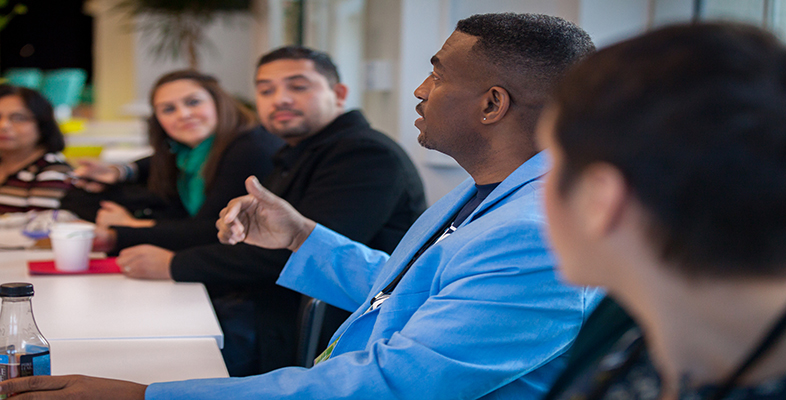1.2 What makes a good translator?
In the activity below, you will look at the skills and competencies that make an effective translator.
Activity 1
What would you say are the main skills and attributes of a good translator? Here is a list of what are often considered the key skills required by translators. After you’ve read the text, select the three which you think are the are the most important, and the three which you think are the least important.
- Professionalism: Ethics are very important in translation. You need to know when to preserve confidentiality, and when to refuse a job because you are not competent to do it.
- Networking skills: People think translation is a solitary activity but in fact translators often work in virtual teams, revising each others’ work or sharing big projects. Project managers have to manage big teams of translators. Freelancers have to meet and attract clients. People skills and playing well with others are a must! Marketing and advertising your work is also going to be very important when working as a freelancer.
- Attention to detail: There’s a bit of the pedant in all translators. If you’ve ever ground your teeth when you see a wrongly used apostrophe this profession might be for you! Translators need great revising and proofreading skills.
- Flexibility/adaptability: Translation is a fast-changing profession and translators have to be prepared to pick up new skills and offer new services such as transcription, copywriting and post-editing.
- Organisational skills: Translation is a very deadline-driven profession. You need to be able to meet deadlines and organise your time effectively. Initiative is important, too.
- Writing skills: This is extremely important. Translators are professional writers. For this, you need to know your own language perfectly: grammar, vocabulary, style. Reading voraciously helps, and so will writing practice such as blogging, student journalism, creative writing. And spelling is really important for translators; bad spelling can give a bad impression to clients.
- General knowledge: General knowledge is very important for translators. It can help you pick up mistakes in texts. Read the papers, watch the news, films and documentaries ... it’s all part of your work!
- Analytical skills: Translators are the best readers that a text will ever have. They need advanced analytical skills to understand how the source text works, so that they can reproduce this in their translation.
- Research skills: Translators may get very different texts to translate from one day to the next and may have to pick up specialised vocabulary quickly. You learn where to find out about cereal and cylinder heads, fish and foot and mouth disease.
- Subject knowledge: Any skills you have can be turned into specialised subject knowledge to help you. It might be law, medicine or mechanics, but it could also be a personal hobby, such as a sport. Think about subjects you know really well, and think about how you could get to know them in your other languages too.
- Curiosity: Curiosity is one of the best attributes you can have as a translator. It will help you to learn new skills, research unfamiliar subjects, look up unfamiliar words you come across, spot potential problems with translation jobs and really get to the heart of what your clients want.
- Excellent knowledge of the foreign language: You need to be able to read widely and easily in your foreign language and understand not only what it says, but what it really means – not always the same thing! Lots of practice reading, watching TV and films, listening to radio in your foreign language(s) will help.
- IT skills: Translation is a very IT-driven profession these days; translators use many online communication systems and a wide range of general and specialised software for word processing, file formatting and translation memory retrieval. Tools for terminology management and machine translation are becoming increasingly embedded in the profession. Software develops fast, and translators need to be able to keep up.
- Good cultural awareness: Language isn’t just about language but also culture. There’s a big difference between the ‘banlieue [suburb] in France and ‘suburbs’ in the UK. In France the ‘banlieue’ are often associated with poverty, social housing and deprivation. Even though it’s technically not the ‘real’ meaning, ‘banlieue’ might be better translated as ‘inner city’ in English.
- Love of reading: Translators are professional writers who need to be able to write well. Wide reading is a must for developing a really good writing style. Read good novels, good-quality journalism (great for your general knowledge too), history, popular science – the more, the merrier. Some translators even get paid for reading books for publishers and commenting on whether they would be worth translating.
Adapted from: National Network for Translation, ‘What are the skills required?’ [Tip: hold Ctrl and click a link to open it in a new tab. (Hide tip)]
Which three skills do you consider the most important for a translator?
Which three skills do you consider the least important for a translator?
Answer
We asked students on our MA in Translation to do this same activity, and they considered the most important skills and attributes to be a translator were:
- Excellent knowledge of a foreign language (88%)
- Writing skills (81%)
- Attention to detail (79%)
Among the skills and attributes they considered the least important, they suggested general knowledge, love of reading, and curiosity.
Did you come up with a similar rating, or did you think other skills were more important?
